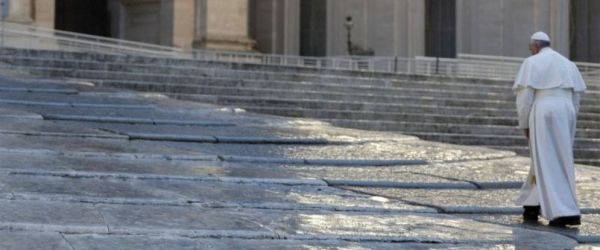[...] The evangelist Mark is telling us of Jesus' action against all kinds of evil, for the benefit of those who suffer in body and spirit: the possessed, the sick, sinners... He presents himself as the one who fights and overcomes evil wherever he encounters it. In today's Gospel (cf. Mk 1:40-45) this fight of His confronts an emblematic case, because the sick person is a leper. Leprosy is a contagious and merciless disease, which disfigures the person, and was a symbol of impurity: the leper had to stay out of built-up areas and signal his presence to passers-by. He was marginalised by the civil and religious community. He was like the walking dead.
The episode of the healing of the leper unfolds in three short passages: the invocation of the sick person, Jesus' response, and the consequences of the prodigious healing. The leper begs Jesus "on his knees" and says to him: "If you wish, you can cleanse me" (v. 40). To this humble and trusting prayer, Jesus reacts with a profound attitude of his soul: compassion. And 'compassion' is a very profound word: compassion that means 'suffering-with-another'. Christ's heart manifests God's paternal compassion for that man by approaching him and touching him. And this detail is very important. Jesus "stretched out his hand and touched him ... and immediately the leprosy disappeared from him and he was cleansed" (v. 41). God's mercy overcomes all barriers and Jesus' hand touches the leper. He does not place himself at a safe distance and does not act by proxy, but exposes himself directly to the contagion of our evil; and so it is precisely our evil that becomes the place of contact: He, Jesus, takes from us our sick humanity and we take from him his healthy and healing humanity. This happens every time we receive a Sacrament with faith: the Lord Jesus 'touches' us and gives us his grace. Here we think especially of the Sacrament of Reconciliation, which heals us from the leprosy of sin.
Once again, the Gospel shows us what God does in the face of our evil: God does not come to "lecture" us on pain; neither does he come to eliminate suffering and death from the world; rather, he comes to take upon himself the weight of our human condition, to carry it to the end, to free us radically and definitively. This is how Christ fights the evils and sufferings of the world: by taking them upon himself and overcoming them with the power of God's mercy.
To us, today, the Gospel of the healing of the leper tells us that, if we want to be true disciples of Jesus, we are called to become, united with him, instruments of his merciful love, overcoming all kinds of marginalisation. To be "imitators of Christ" (cf. 1 Cor 11:1) when faced with a poor person or a sick person, we must not be afraid to look them in the eye and approach them with tenderness and compassion, and to touch and embrace them. I have often asked people who help others to do so by looking them in the eye, not to be afraid to touch them; that the gesture of helping is also a gesture of communication: we too need to be welcomed by them. A gesture of tenderness, a gesture of compassion... But I ask you: when you help others, do you look them in the eye? Do you welcome them without fear of touching them? Do you welcome them with tenderness? Think about this: how do you help? At a distance or with tenderness, with closeness? If evil is contagious, so is good. Therefore, good must abound in us, more and more. Let us be infected by the good and let us infect the good!
[Pope Francis, Angelus 15 February 2015]












